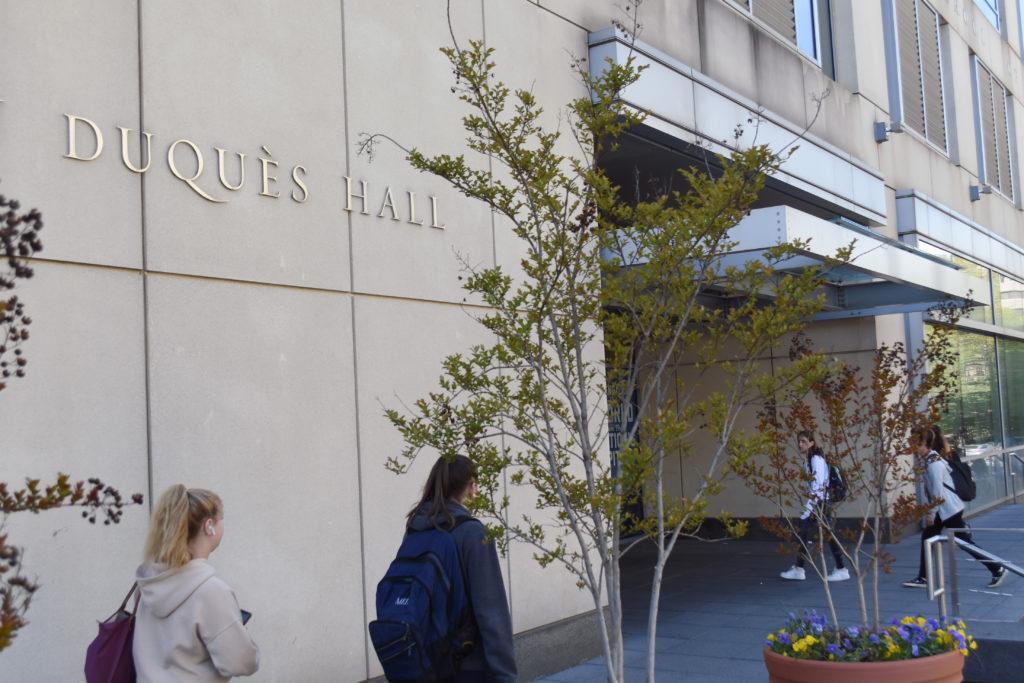A donor-funded professorship in the School of Business has remained vacant for the sixth year in a row.
The Lindner-Gambal Professorship in Business Ethics has not been filled since the previous holder left the position in 2013. While current postings for the teaching job appear on some websites, Kirsten Martin, the chair of the strategic management and public policy department, said officials did not form a search committee this year to find candidates for the role, and administrators declined to confirm whether the University is currently searching for a candidate.
University spokesman Jason Shevrin declined to say if administrators still hope to fill the vacancy or if they are currently searching for candidates to fill the position. He also declined to say how many candidates have applied to the position in the past year, how many interviews have been conducted for the position and why the position has remained vacant for six years.
Shevrin declined to say how the vacancy has impacted the business school’s academics.
“Under the leadership of Dean Mehrotra, GWSB has made substantial progress on the Lindner-Gambal Business Ethics Professorship,” Shevrin said in an email. “GW leaders have been in contact with the donors about the professorship.”
A spokeswoman for the Clark Foundation, a philanthropic organization that funds the endowed professorship, deferred to the business school for comment.
The Lindner-Gambal professorship was created in 2004 through a grant from A. James Clark, a trustee who died in 2015. The position is named for alumni Thaddeus Lindner and Sergius Gambal, who graduated in the 1950s.
Martin, the chair of the strategic management and public policy department, said she heard that officials in the business school’s Office of Development and Alumni Relations are working with Clark Foundation donors to reassess the business school’s strategy for filling the vacant position. Martin had previously served on a search committee to fill the post.
Last year, administrators told a five-person search committee that the search process failed, but they did not explain why, faculty members told The Hatchet at the time.
Martin said that if administrators notified the search committee about why the process failed in the past, committee members could work with officials to identify and solve the root causes.
“If you imagine you’re the new dean, you don’t know why it failed, you don’t know how to fix the situation,” she said.
Taking a year off to assess the issues that caused the last search to fail could help the next search process avoid a similar fate, she said.
Tim Fort, the last faculty member to hold the Lindner-Gambal professorship from 2005 to 2013, said he was not surprised that the position has remained vacant for several years. He compared the post to a vacancy for a similar position – the David E. Gallo Professor of Business Ethics at the University of Notre Dame – which has been unfilled for four years.
He said search committees might struggle to find a qualified candidate because the business ethics field lacks journals recognizing top scholars in the discipline.
“There is a very specific set of journals that someone would publish in to know that they are a star in the field of marketing and accounting,” he said. “Ethics is harder on that because there are fewer ethics journals, and there is a wide variety that comes from all different kinds of departments that you could make ethics-based research in disciplines that others are unfamiliar with.”
Fort said the next person to fill the endowed professorship could come from a variety of different backgrounds in business ethics but should have some research experience.
“They don’t necessarily need to have a Ph.D. in the field like I did,” he said in an email. “They do have to have some grounding of having done research and teaching in order to have a chair in that field.
Fort said that although the business school lacks its endowed professor of business ethics, the school’s faculty are still able to instill ethics in their students through the Institute for Corporate Responsibility, a research center for business ethics that he started in the business school in 2006.





